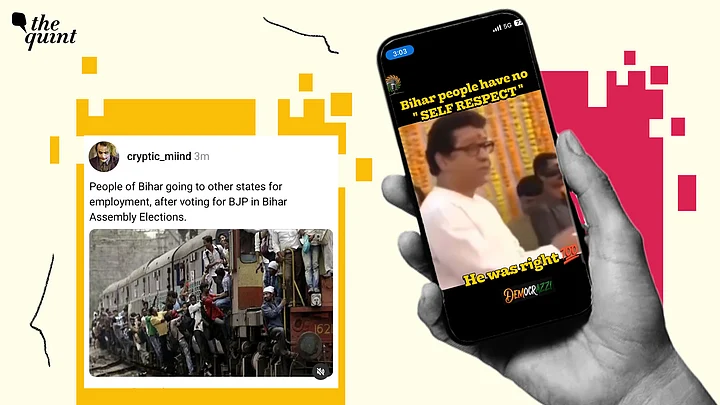The recent Bihar Assembly elections concluded with the National Democratic Alliance (NDA), under the slogan of 'double engine sarkar', coming out with a decisive mandate by winning 202 seats out of 243—an outcome that many psephologists, political scholars, and civil society had not expected.
Bihar, a state that has historically been celebrated for its political consciousness and willingness to go against the national trend, did not deliver the unexpected twist that many in New Delhi had anticipated.
The widespread discourse against Bihar voters as ‘politically ignorant’ that appeared on social media afterwards was disturbing: a barrage of humiliating memes, casual xenophobic remarks, and an old Raj Thackeray speech on Bihari labourers not questioning their state government for 'lack of employment’ resurfaced on digital platforms as a justification for racist attacks on migrant workers working in other states.
Delhi’s Selective Outrage
Let’s confront this prejudice for what it truly is: racism disguised as a political saviour complex.
For decades, the upper-caste elites of South Delhi, Lutyens Delhi, and the newly uplifted middle class of the NCR region have maintained a dualistic notion of liberalism—where flaunting their awareness of Zohran Mamdani’s win in the New York mayoral election or quoting Gayatri Spivak’s postcolonial arguments justifies their progressive credentials and liberal purity.
Yet, everyday caste and class discrimination against guards, sanitary workers, delivery boys, and house helpers—most of whom are Bihari—remains an accepted social norm.
Interestingly, the Bihar election results have allowed Delhi elites to critique the same segregated community as politically aloof, while masking their biases under the pretence of moral outrage, claiming that Bihari migrants deserve racism for being ignorant voters.
Within hours of the election results, a social media meme was widely circulated, showing Bihari labourers boarding trains and allegedly moving to other states for the next five years. This depiction was not only an insensitive joke about India’s labour workforce, but also disfranchised their voting rights.
Sexist and misogynistic comments targeting women voters, claiming they sold their votes for Rs 10,000 under the Mukhyamantri Mahila Rojgar Yojna (MMRY), reflect an elitist syndrome that fails to acknowledge Bihar’s traditional patriarchal society. In this context, giving agency and subjectivity to subaltern groups has always been challenging. Instead of recognising women’s political engagement, such sexist remarks delegitimised their participation.
The Class That Mocks, and Profits
Ironically, the upper caste-class elites who criticise Bihari voters for their democratic choices and mock Bihari women for using welfare schemes are the same bourgeois group profiting from exploiting unorganised menial services performed by Bihari labourers in their gated communities.
This saviour complex becomes even clearer when it reflects a pattern seen in how liberal elites treat other subaltern groups, like Muslims, whose actions are often essentialised, forcing them to justify their socio-political claims. Likewise, Bihari voters are made to justify their electoral decisions. Interestingly, Bihar is expected to be the custodian of India’s democracy by the very liberal elites in Delhi, who in the last two terms have elected controversial Hindu sectarian leaders as their MPs.
Instead of pontificating on democratic ethics, what liberal elites of Delhi are conveniently ignoring in post-election discussions is the dubious role of the Election Commission and the systematic erosion of a level playing field through measures like SIR (Special Intensive Revision), which began with the deletion of 68 lakh electors, but later saw 24 lakh voters added before the election.
The violation of the model code of conduct through communal sloganeering and the distribution of money under welfare schemes during the campaign leaves no doubt about the institutional biases faced by the opposition. Additionally, Prashant Kishor and his Jan Suraaj party may have failed in their political venture; however, their future cannot be dismissed, especially after securing a 3.5 percent total vote share while playing a spoiler role in 35 seats, of which 19 were won by the NDA and 13 by the Mahagathbandhan (MGB).
Identity Politics Is Not Ignorance
Bihar has a distinctive political landscape where identity politics play a significant role. The emergence of Prashant Kishor, who emphasises a move beyond traditional politics, signals the potential for a third front in future elections. However, it remains too early to dismiss the importance of identity politics in Bihar, where the MY (Muslim-Yadav) identity is typically associated with the Mahagathbandhan, and the Forward, EBC, and Non-Yadav OBC identities align with the NDA.
Moreover, from an outsider’s perspective, such as that of liberal elites in Delhi, identity politics might be perceived as political naivety, especially given Bihar’s low ranking in the Human Development Index across various areas.
Nevertheless, this does not suggest that Bihari voters are politically illiterate; their sense of identity is shaped by caste, historical ties, and aspirations for social mobility in a land where Gandhi launched Satyagraha, JP democratised politics, the Mandal Commission revolutionised social justice, and Lalu Prasad Yadav halted Advani’s Rath Yatra to prevent widespread communal violence.
Historically, Bihar embodies the fight for social justice through its political awareness. They don’t need lessons from upper-caste liberal elites in Delhi, who have marginalised them as migrant workers and now mock them racially as failed voters, all while claiming to be their saviours. If liberal elites genuinely care about Indian democracy, the discussion should focus on the erosion of institutions. Bihar will shape its own discourse, as it has done in the past.
(Satkirti Sinha is a Graduate teaching assistant and a PhD research scholar in the Performing Arts department at DMU University, Leicester. This is an opinion piece and the views expressed above are the author’s own. The Quint neither endorses nor is responsible for the same.)
